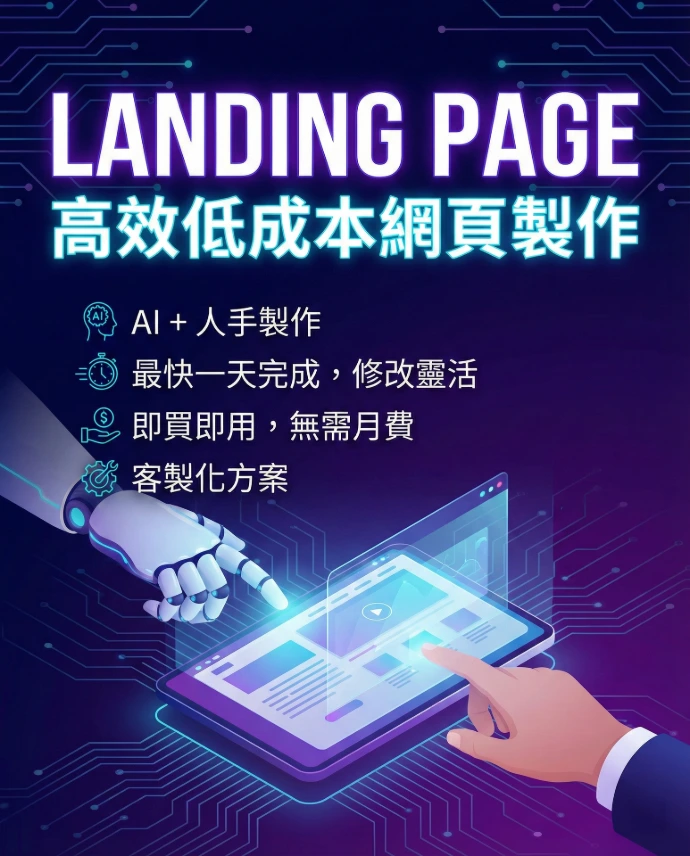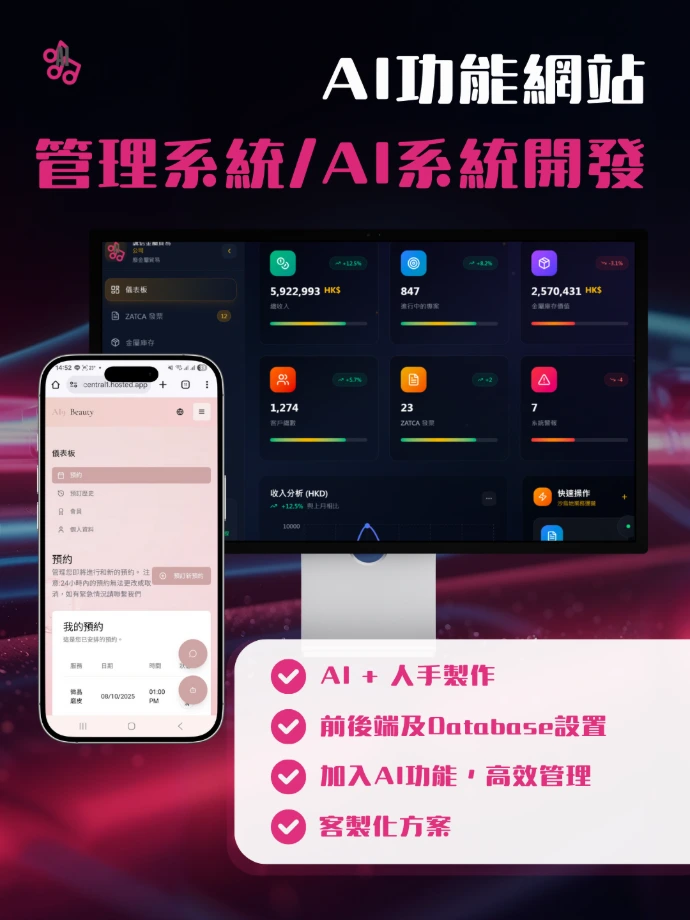AI Transformation: From Concept to Practice, Master Future Competitiveness!
In recent years, "AI" has ceased to be a term exclusively for tech giants; it's rapidly permeating various industries, reshaping the way we live and work. Especially with the increasing prevalence of "Generative AI", more and more enterprises are realizing this trend is irreversible. However, moving from initial curiosity and exploration of AI to actually transforming this technology into tangible advantages for a business, many might face similar confusion: "What exactly is AI transformation? Does our company truly need it? And where do we even begin?"
What is AI Transformation?
Why is AI Transformation an Essential Journey for Enterprises?
How to Undertake AI Transformation?
What is AI Transformation?
When we talk about "AI transformation," many instinctively think of adopting AI software, tools, or automating certain processes. While these are certainly part of AI transformation, limiting it to just that might underestimate its true meaning.
Essentially, AI transformation refers to an enterprise's comprehensive optimization and reshaping of its business processes, product services, customer experience, and even organizational culture, using artificial intelligence technology. It's not merely a technical overlay but a deep, strategic change aimed at leveraging the power of AI to enhance the enterprise's core competitiveness and innovation capabilities.
In simple terms, AI transformation encompasses the following core elements:
- Data-Driven Decision Making: Allowing AI to deeply analyze vast amounts of data, extract insights, and assist businesses in making more precise commercial judgments. This fundamentally differs from past decision-making reliant on experience or intuition.
- Process Automation & Optimization: Utilizing AI to automate high-volume, repetitive tasks with clear rules, freeing up human resources while improving efficiency and accuracy. Examples include customer service chatbots and intelligent manufacturing.
- Product & Service Innovation: Developing smarter, more personalized products and services through AI technology, creating new business models and value.
- Enhanced Customer Experience: Using AI to analyze customer behavior and preferences, providing personalized recommendations, precise marketing, and instant customer service, thereby improving customer satisfaction and loyalty.
- Organizational Culture & Talent Development: AI transformation requires employees to adopt an AI mindset and be willing to learn new tools. Therefore, internal talent training and cultural development within the organization are equally crucial.
So, AI transformation is not a one-off project but a continuous, evolving, and systemic endeavor that involves every level of the enterprise. It demands that business leaders possess a forward-thinking mindset, dare to invest, and lead their teams in embracing this change together.
Why is AI Transformation an Essential Journey for Enterprises?
Perhaps you're asking, "My business is currently running well. Is it really necessary to spend time and money on AI transformation?" The answer is yes, and it's urgent. In today's rapidly changing business environment, AI transformation is no longer an option; it's a prerequisite for enterprise survival and development.
Here are several key reasons why AI transformation is vital for your business:
Increased Efficiency & Cost Reduction: Imagine if your customer service department could have AI assistants handle 80% of common inquiries, allowing employees to focus on more complex cases; if production lines could use AI for intelligent scheduling and fault prediction, both production efficiency and quality would significantly improve. AI's automation capabilities can substantially reduce labor costs and optimize resource allocation, bringing immense benefits to enterprises. This isn't just about saving expenses but about investing limited resources where they generate the most value.
Precise Insights, Seizing Market Opportunities: Data is the new oil of our era, and AI is the refinery that processes this oil. Businesses generate massive amounts of data daily, and traditional manual analysis struggles to extract valuable information. AI, however, can quickly process this data, identify trends, predict market movements, and analyze customer behavior, helping enterprises gain an edge in competition, make smarter decisions, rather than groping in the dark.

AI SEO helps your website appear in AI searches.
Creating Innovative Products & Services, Building Differentiated Competitive Advantages: AI not only optimizes existing operations but also unlocks infinite innovation potential. From personalized recommendation systems, intelligent voice assistants, and automated content generation, to smart manufacturing and predictive maintenance, AI is reshaping products and services across all industries. Through AI transformation, enterprises can develop more innovative products that better meet market demands, thereby establishing unique competitive barriers. If your competitors are leveraging AI to innovate and you are not, you will quickly be left behind.
 +
+  =
= 
Created by 99aicreator
Optimizing Customer Experience, Enhancing Satisfaction & Loyalty: In an era of increasing consumer choices, customer experience is the key to winning. AI can help businesses understand customer needs and preferences more deeply, providing hyper-personalized services. For example, AI-powered chatbots can offer 24/7 instant support; intelligent recommendation systems can precisely suggest products customers might be interested in; and data analytics can help businesses predict customer churn risk and intervene proactively. All these can significantly improve customer satisfaction and cultivate a loyal customer base.
Addressing Talent Challenges, Enhancing Employee Capabilities: The future of work will be human-machine collaboration. AI will take over repetitive, rule-based tasks, while human employees can focus on work requiring creativity, strategy, and human interaction. This means enterprises need to re-skill employees, teaching them how to collaborate with AI and utilize new tools. Successful AI transformation is not just about technology adoption but also about organizational cultural change and employee skill enhancement, ensuring the enterprise has a high-quality workforce in the AI era.
Improving Risk Management & Compliance: AI also has significant potential in risk management and compliance. For example, financial institutions can use AI for fraud detection, manufacturing can predict equipment failures, and healthcare organizations can assist with diagnosis. AI's analytical capabilities can help businesses identify potential risks earlier and take preventive measures, reducing losses.
How to Undertake AI Transformation?
Having understood the importance of AI transformation, the next logical step is: "How exactly do we do it?" AI transformation is not an overnight task; it requires strategic planning, incremental implementation, and deep integration with corporate culture.
Here are several key steps and considerations for undertaking AI transformation:
Step One: Establish a Clear Transformation Vision and Goals
Any successful transformation begins with clear objectives. Before launching AI transformation, enterprises must clarify the following questions:
- Why transform? Is it to solve specific pain points (e.g., high costs, low efficiency, customer churn) or to explore new markets and achieve business growth?
- What are the transformation goals? Is it to increase efficiency by 20% in a specific department? Or to develop an entirely new AI product? Specific, measurable goals are fundamental to success.
- How will AI integrate into existing operations? Consider how AI can combine with existing business processes and data assets to create maximum value.
This step requires active participation and support from top management, fostering consensus, and communicating the transformation vision to all employees.
Step Two: Evaluate Existing Foundations and Data Preparedness
AI's fuel is data. Before embarking on AI transformation, enterprises need to conduct a comprehensive assessment of their data foundation:
- Data Types, Sources, and Quality: What data does your enterprise possess? Where is it stored? Is the data complete, accurate, and usable?
- Data Governance and Infrastructure: Is there a robust system for data collection, storage, processing, and management? Is the data infrastructure sufficient to support AI applications?
- Existing Technical Capabilities: Does the enterprise have basic internal IT capabilities and data analytics skills?
This step might involve data cleaning, integration, or even establishing new data collection pipelines. If the data foundation is weak, AI's potential will be difficult to unleash.
Step Three: Start with Small Projects for Quick Wins
AI transformation is a complex process; it's not advisable to aim for a comprehensive solution from the outset. A wise approach is to start with small, high-impact, low-risk pilot projects to quickly accumulate experience and success stories.
- Choose application scenarios with clear pain points: For example, start with customer service automation, intelligent recommendations, or specific process automation.
- Set short-term achievable goals: Allow the team to see the practical benefits of AI in a short period, boosting confidence.
- Iterate and Adjust Quickly: Through small-scale implementation, identify problems promptly, make adjustments and optimizations, laying the groundwork for wider adoption.
This "crawl-walk-run" strategy can effectively mitigate transformation risks and gradually build internal acceptance of AI.
Step Four: Select Appropriate AI Technologies and Partners
The market is flooded with AI technologies, and choosing the right tools and platforms for your enterprise is crucial. Businesses can consider the following aspects:
- Open Source vs. Commercial Solutions: Choose based on your enterprise's technical capabilities, budget, and customization needs.
- Cloud vs. On-Premise Deployment: Consider factors like data security, scalability, and cost.
- Seek Professional AI Solutions Agencies: If the enterprise lacks internal AI expertise, partnering with an external AI solutions agency is a smart move. They possess rich industry experience and technical capabilities, offering customized solutions to accelerate the transformation process. Just like 99AICreator mentioned at the beginning of this article, they can provide diverse services from AI automation, AI model development, AI advertising, to AI customer service.
Step Five: Cultivate an AI Mindset and Talent, Build a Learning Organization
The adoption of technology ultimately relies on people to implement and apply it. Successful AI transformation is inseparable from internal talent development and cultural building.
- Conduct AI-Related Training: Enhance employees' understanding of AI, letting them know how AI will change work, and teaching them to use new AI tools.
- Encourage Experimentation & Innovation: Foster a culture that encourages employees to experiment with AI applications and not fear failure.
- Establish Cross-Departmental Collaboration Mechanisms: Ensure technical teams, business teams, and management teams work closely together to drive AI projects.
- Recruit AI Professionals: When necessary, recruit talent with expertise in data science, machine learning, and other areas to supplement internal capabilities.
Step Six: Continuous Monitoring, Evaluation, and Iterative Optimization
AI transformation is an ongoing process, not a one-time project. Enterprises need to establish effective monitoring mechanisms, regularly evaluate the effects of AI applications, and make adjustments and optimizations based on feedback.
- Set Key Performance Indicators (KPIs): Track the impact of AI projects on efficiency, cost, customer satisfaction, etc.
- Regularly Review and Adjust Strategies: Adapt AI transformation strategies as technology evolves and market conditions change.
- Learn and Share Experiences: Encourage internal teams to share success stories and lessons learned, fostering a positive feedback loop.
AI Transformation Case Studies: Witnessing the Infinite Possibilities Created by AI
To give everyone a more concrete understanding of AI transformation, let's look at how some companies have achieved significant breakthroughs through AI:
- Personalized Recommendations in Retail: E-commerce giants like Amazon use AI to analyze vast amounts of user Browse and purchase data, providing highly personalized product recommendations for each customer. This has not only dramatically increased sales but also optimized the customer's shopping experience. This AI-driven precision marketing is something traditional retail struggles to match.
- Smart Factories in Manufacturing: Many manufacturing companies have adopted AI-driven predictive maintenance systems. AI can monitor machine operation data, predict potential failures, and issue early warnings before a breakdown occurs, thereby avoiding costly downtime and improving production efficiency and product quality. This is a core manifestation of intelligent manufacturing.
- Risk Management in Finance: Banks and financial institutions utilize AI for anti-fraud detection and credit assessment. AI models can quickly identify anomalous transaction patterns and predict loan default risks, significantly enhancing risk control capabilities and protecting corporate assets.
- Assisted Diagnosis in Healthcare: AI has shown astonishing potential in medical image analysis. For example, AI can assist doctors in more precisely identifying lesions in medical images, accelerating diagnosis, and providing personalized treatment suggestions, leading to better patient outcomes.
- Customer Service Automation: Many businesses, large and small, are starting to implement AI chatbots to handle customer inquiries. These bots can answer common questions 24/7 and even process simple order inquiries, greatly reducing the burden on human customer service while improving response times.
These cases all demonstrate that regardless of industry size, as long as the right entry point is found and AI transformation is strategically implemented, substantial benefits can be achieved.
Conclusion: Start Your AI Transformation Journey, Embrace the Intelligent Future!
Enterprise AI transformation is a journey filled with opportunities. It's not just about technology adoption but also about a paradigm shift in corporate thinking, a reshaping of organizational culture, and an upgrade of the talent pool. This path may be challenging, but as we've seen, the potential rewards are immense—lower costs, higher efficiency, more precise strategies, more innovative products, and more satisfied customers.
If you are considering initiating or accelerating your AI transformation, remember that you are not alone. Partnering with a professional AI solutions agency like 99AICreator can provide you with tailored solutions, from strategic planning to technical implementation, and continuous optimization, ensuring your AI transformation journey is smooth and successful.
~
`














